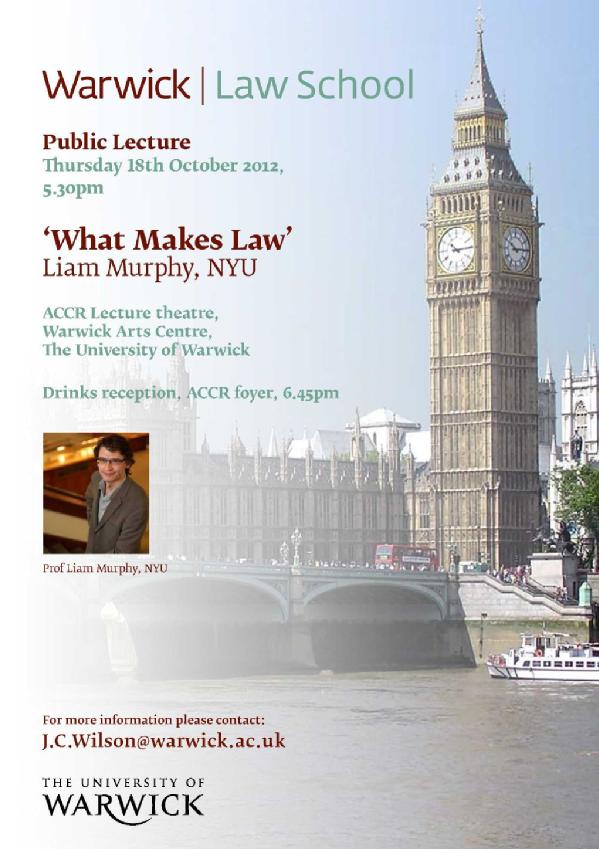Events
Warwick Law School Events
Find out what's happening
There are lots of exciting events happening within the Law School. Plus there are many other University and external events which may be of interest. We have therefore collated them all into one central calendar to help you choose which you would like to attend.
Public Lecture: Liam Murphy, NYU, ‘What makes law’
Thursday 18th October 2012, Liam Murphy, NYU, ‘What makes law’ 5:30pm, ACCR, Warwick Art Centre with drinks reception at 6:45pm in the foyer.

My lecture concerns an old philosophical question about the nature of law. It is a question about the relation between law and morality. When we are trying to figure out what the law is in a particular place, do moral considerations play any role? Everyone agrees that statutes and decisions of courts are relevant to fixing the content of existing law, but there is deep disagreement about whether, in reading these sources, moral judgment is required. To fix labels, positivists insist that morality is never relevant to determining the content of existing law; to think otherwise, they say, is to confuse what is with what ought to be. Nonpositivists, in stark contrast, insist that you cannot hope to find out what the law is without reading legislation and past decisions in their morally best light; to think otherwise is to miss the basic truth that law is something good, or at least striving to be something good, and deserving of our allegiance.
This is a dispute about the grounds of law—about what factors determine the content of the law in force. The disagreement matters, because if we don’t know the grounds of law we won’t be able to figure out what the law is. And we need to know what the law is.
But the two sides in this old debate are unlikely to be moved by argument. In my view, the two sides reflect two very different ground-level sets of beliefs about the kind of thing law is and no argument for either positivism or nonpositivism is likely to carry greater conviction than those initial beliefs.
So the dispute matters, but there is no prospect for progress? Things are not as bad as they might seem, for in practice there is a great deal of overlap between the implications of the two theories of the grounds of law for particular cases. That positivists and nonpositivists can for the most part agree about what the content of the law is perhaps explains why practicing lawyers have never been terribly worried by the standoff between the two camps.
But we should all be aware that there are these two foundational views about the nature of law. For in some cases the different views about the grounds of law do lead to different conclusions about the content of law. This kind of disagreement is basic; it is not akin to a purely technical disagreement among lawyers. We need to be able to know it when we see it if we are to understand the complexity of our political and moral discourse about the significance of law.
Organising an event that you would like to share with the Warwick Law School community?
Complete our event submission form
